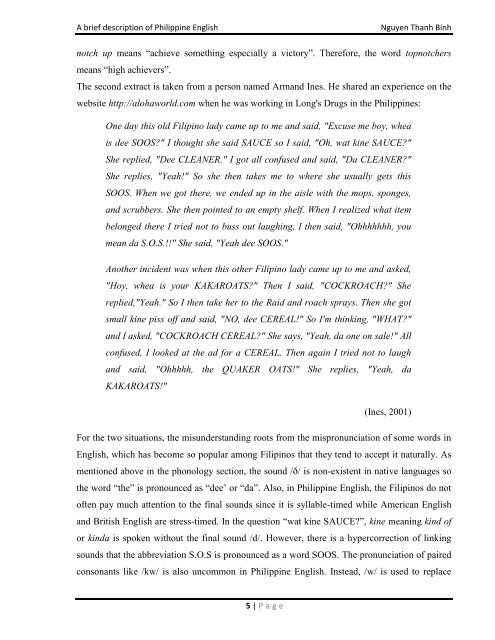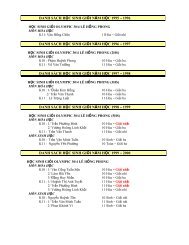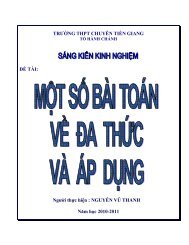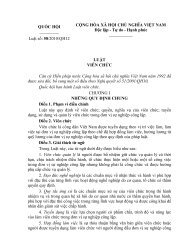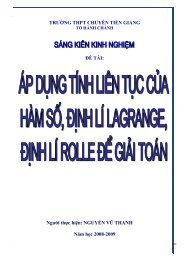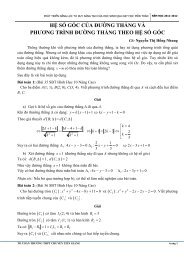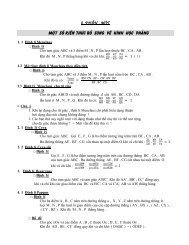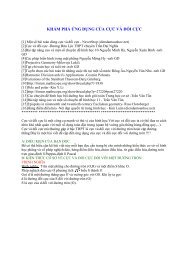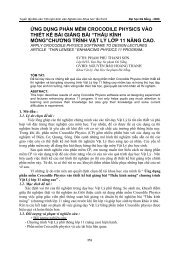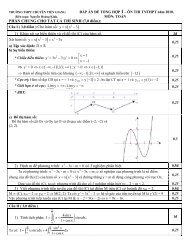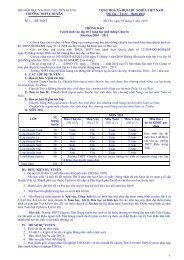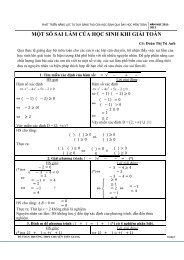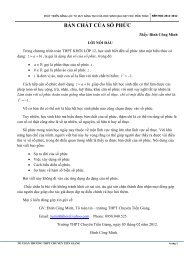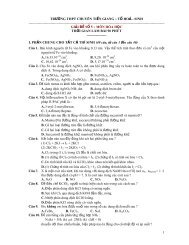A BRIEF DESCRIPTION OF PHILIPPINE ENGLISH
A BRIEF DESCRIPTION OF PHILIPPINE ENGLISH
A BRIEF DESCRIPTION OF PHILIPPINE ENGLISH
You also want an ePaper? Increase the reach of your titles
YUMPU automatically turns print PDFs into web optimized ePapers that Google loves.
A brief description of Philippine English Nguyen Thanh Binh<br />
notch up means “achieve something especially a victory”. Therefore, the word topnotchers<br />
means “high achievers”.<br />
The second extract is taken from a person named Armand Ines. He shared an experience on the<br />
website http://alohaworld.com when he was working in Long's Drugs in the Philippines:<br />
One day this old Filipino lady came up to me and said, "Excuse me boy, whea<br />
is dee SOOS?" I thought she said SAUCE so I said, "Oh, wat kine SAUCE?"<br />
She replied, "Dee CLEANER." I got all confused and said, "Da CLEANER?"<br />
She replies, "Yeah!" So she then takes me to where she usually gets this<br />
SOOS. When we got there, we ended up in the aisle with the mops, sponges,<br />
and scrubbers. She then pointed to an empty shelf. When I realized what item<br />
belonged there I tried not to buss out laughing. I then said, "Ohhhhhhh, you<br />
mean da S.O.S.!!" She said, "Yeah dee SOOS."<br />
Another incident was when this other Filipino lady came up to me and asked,<br />
"Hoy, whea is your KAKAROATS?" Then I said, "COCKROACH?" She<br />
replied,"Yeah." So I then take her to the Raid and roach sprays. Then she got<br />
small kine piss off and said, "NO, dee CEREAL!" So I'm thinking, "WHAT?"<br />
and I asked, "COCKROACH CEREAL?" She says, "Yeah, da one on sale!" All<br />
confused, I looked at the ad for a CEREAL. Then again I tried not to laugh<br />
and said, "Ohhhhh, the QUAKER OATS!" She replies, "Yeah, da<br />
KAKAROATS!"<br />
5 | P a g e<br />
(Ines, 2001)<br />
For the two situations, the misunderstanding roots from the mispronunciation of some words in<br />
English, which has become so popular among Filipinos that they tend to accept it naturally. As<br />
mentioned above in the phonology section, the sound /ð/ is non-existent in native languages so<br />
the word “the” is pronounced as “dee‟ or “da”. Also, in Philippine English, the Filipinos do not<br />
often pay much attention to the final sounds since it is syllable-timed while American English<br />
and British English are stress-timed. In the question “wat kine SAUCE?”, kine meaning kind of<br />
or kinda is spoken without the final sound /d/. However, there is a hypercorrection of linking<br />
sounds that the abbreviation S.O.S is pronounced as a word SOOS. The pronunciation of paired<br />
consonants like /kw/ is also uncommon in Philippine English. Instead, /w/ is used to replace


